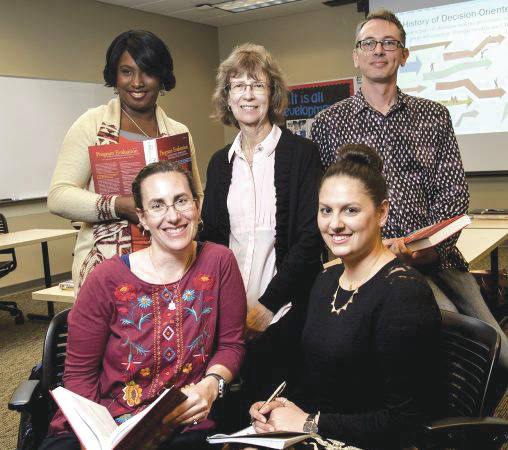
FAIRBORN — She is a graduate of the United States Military Academy at West Point and served in the Army for a decade. Over the years, she has worked in a variety of government jobs and served as vice president of training for an international nonprofit that served more than 2 million military families.
Today, Erin Lunday is among students at Wright State University working to become certified as program evaluators, people who collect and analyze information to measure the effectiveness and efficiency of programs in education, government, business and nonprofits.
“I started thinking about everything I had done in the Army and in the civilian world and realized I had been evaluating programs but didn’t know how to do it,” said Lunday. “The language is not the same based upon your field, so it can be a very painful process. I can see this certificate being useful in a variety of different disciplines.”
The university’s new Program Evaluation certificate program was started by Suzanne Franco, director of the Ed.D. program in organizational studies in the College of Education and Human Services. The certificate program provides graduate students with the needed skills and working knowledge of theories, models and demands of program evaluation.
Franco taught in Ohio K-12 schools for about 20 years before earning her Ed.D. in Urban Educational Leadership at the University of Cincinnati. She joined the faculty at Wright State in 2006 to teach statistics, research methods and education leadership courses. During her first year she was approached about being a program evaluator for a grant application.
In applying for grants, the funding agency often requires a program evaluator, an unbiased person who is not going to benefit if the proposed objectives are met or not.
“So I work with them to develop tools to measure success, to collect evidence that the success was there and to document that the researchers did what they actually said they were going to do,” she said.
Within a 15- to 20-page grant proposal, there is an entire section devoted to program evaluation design, plans and activities.
If the grant is funded, the program evaluator then works with the researcher during implementation of the project. The whole process can take up to five years, depending on the proposed project.
Franco has been a program evaluator for years and has numerous clients in the area. When she retires in the next few years, those clients will need program evaluators to help keep federal grants coming in.
“I’m going to train some students that can take on evaluation of one or two projects a year and follow through for three or four years,” she said. “And I can be a mentor for my students as they start into the field.”
Franco said graduate students often become good program evaluators just through the course of doing research. But they usually move into their own fields following graduation.
“They get very involved in research, questionnaire development, survey analysis, all the tools,” she said. “We have some very good program evaluators here on campus.”
Franco said program evaluators must have strong interpersonal skills, be good listeners and be diplomatic with their clients.
“Some clients are very appreciative; others don’t like you,” she said. “You’re always questioning them.”
The seeds of program evaluation were planted in Great Britain in the 1800s when the populace became dissatisfied with educational and social programs. The emergence of modern program evaluation in the United States occurred in the 1960s with the explosion of federal social programs. It became a profession in the 1970s.
Businesses sometimes use program evaluators to analyze company policies and procedures.
“There are currently huge program evaluation businesses all over the country,” Franco said. “And they have different specialties.”
Franco said the field of program evaluation is a heavenly endeavor for those who love learning new things.
For example, in doing program evaluation, Franco has been able to visit research labs at Wright-Patterson Air Force Base. And in evaluating a program in materials engineering, she got an up-close look at a steel foundry, standing in the shadow of massive crucibles of molten metal.
“It’s just a lot of fun,” she said. “And the fun, fun part is that a lot of times when we are collecting data, we have these ‘aha’ moments — something we didn’t really expect — and we want to drill deeper into why that happened.”
Wright State students seeking certification must complete a research qualitative course and a research quantitative course as well as several electives that include such topics as statistics and equation modeling.
Among the students in the program is Daniella DiMasso-Shininger, who is working on her doctorate in organizational studies and currently teaches language arts at Miamisburg High School.
“In education especially, there is a huge amount of evaluation that goes on with curriculum, with instruction, with standards and new assessments,” she said. “So this is something that gives me insight into my profession.”
Lunday’s career goal is to teach organizational behavior at the college level.
“I’m also interested in going into more of the business world and evaluating organizations from the concept of retention and recruiting and organizational identity and self identity — evaluating their retention programs and their recruiting programs,” she said. “So this is a perfect fit for that.”


